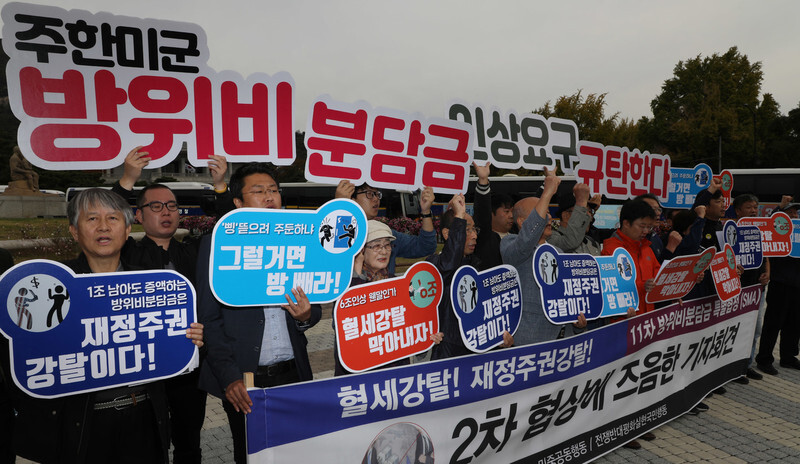hankyoreh
Links to other country sites 다른 나라 사이트 링크
S. Korea rushes to enact special legislation to support USFK employees on unpaid furlough

As negotiations on the 11th South Korea-US Special Measures Agreement (SMA) on defense cost sharing for this year have run into difficulties in their late stages, the South Korean government has been ramping up efforts to enact special legislation to support around 4,000 South Korean employees under US Forces Korea (USFK) who have been put on unpaid furlough as of Apr. 1. The labor union for South Korean USFK employees expressed hopes that a special act could increase the South Korean government’s bargaining capabilities as it lightens the burden from the workers’ unpaid furlough.
“We are currently cooperating with related ministries to consider support measures and procedures to be reflected in the enactment of special legislation to support the livelihood of workers on unpaid furlough,” a Ministry of National Defense (MND) senior official said on Apr. 6.
“We’re also discussing the matter with the National Assembly,” the official added.
The reason the government is working to enact special legislation has to do with a current situation where it remains impossible to predict when a deal will be reached on the sharing of defense costs between South Korea and the US. While the South Korean and US delegations to cost-sharing negotiations recently reached a consensus on the broader framework of negotiations, US President Donald Trump’s instructions for “additional negotiations” suggest some time will be needed before a final agreement is reached.
A Ministry of Foreign Affairs (MOFA) senior official said, “My understanding [of the defense cost-sharing negotiations] is that it’s a situation where we need to communicate and coordinate on the discussions between the two sides’ negotiating officials and governments rather than simply waiting for a final determination.”
With the delay in reaching an agreement on the sharing of defense costs, around 4,000 South Korean employees of USFK are facing a forced unpaid furlough as of Apr. 1 -- with the damages associated with the novel coronavirus outbreak only compounding their livelihood issues.
To prepare for the possibility of a deal not being reached, the South Korean government has reportedly had related ministries -- including MND, the Ministry of Employment and Labor, MOFA, and the Ministry of Economy and Finance -- meeting to discuss measures for supporting South Korean USFK employees, which have resulted in a consensus toward providing support by means of enacting special legislation. Currently, South Korean employees of USFK cannot be provided with unpaid furlough allowances or other support because they are not subject to the terms of domestic law.
A consensus has also reportedly taken shape in the National Assembly on the need to provide support to South Korean USFK employees. Commenting on the relocation of the Yongsan garrison in Seoul to Camp Humphreys in Pyeongtaek, Gyeonggi Province, in September 2017, the National Assembly Environment and Labor Committee adopted a resolution calling for pan-governmental support measures for South Korean employees of USFK, noting the “intensifying employment worries of South Korean workers as the base is relocated.”
Son Ji-o, secretary-general of the USFK Korean Employees Union, said that South Korean workers are “treated as pawns every time there are negotiations on defense costs.”
“This problem needs to be resolved at the source through the enactment of special legislation,” he urged.
Son also predicted, “Once a special law has been enacted, we can break the cycle of the US government treating South Korean workers as pawns to pressure South Korea into accepting large increases in its share of defense costs.”
“In some respects, it would improve the South Korean government’s bargaining position,” he said.
By Kim So-youn, staff reporter, and Park Byong-su, editorial writer
Please direct comments or questions to [english@hani.co.kr]

Editorial・opinion
![[Column] Life on our Trisolaris [Column] Life on our Trisolaris](https://flexible.img.hani.co.kr/flexible/normal/500/300/imgdb/original/2024/0505/4817148682278544.jpg) [Column] Life on our Trisolaris
[Column] Life on our Trisolaris![[Editorial] Penalties for airing allegations against Korea’s first lady endanger free press [Editorial] Penalties for airing allegations against Korea’s first lady endanger free press](https://flexible.img.hani.co.kr/flexible/normal/500/300/imgdb/original/2024/0502/1817146398095106.jpg) [Editorial] Penalties for airing allegations against Korea’s first lady endanger free press
[Editorial] Penalties for airing allegations against Korea’s first lady endanger free press- [Editorial] Yoon must halt procurement of SM-3 interceptor missiles
- [Guest essay] Maybe Korea’s rapid population decline is an opportunity, not a crisis
- [Column] Can Yoon steer diplomacy with Russia, China back on track?
- [Column] Season 2 of special prosecutor probe may be coming to Korea soon
- [Column] Park Geun-hye déjà vu in Yoon Suk-yeol
- [Editorial] New weight of N. Korea’s nuclear threats makes dialogue all the more urgent
- [Guest essay] The real reason Korea’s new right wants to dub Rhee a founding father
- [Column] ‘Choson’: Is it time we start referring to N. Korea in its own terms?
Most viewed articles
- 1New sex-ed guidelines forbid teaching about homosexuality
- 260% of young Koreans see no need to have kids after marriage
- 3[Column] Life on our Trisolaris
- 4OECD upgrades Korea’s growth forecast from 2.2% to 2.6%
- 5Presidential office warns of veto in response to opposition passing special counsel probe act
- 6Months and months of overdue wages are pushing migrant workers in Korea into debt
- 7[Guest essay] Maybe Korea’s rapid population decline is an opportunity, not a crisis
- 8Trump asks why US would defend Korea, hints at hiking Seoul’s defense cost burden
- 9[Editorial] Penalties for airing allegations against Korea’s first lady endanger free press
- 10Japan says it’s not pressuring Naver to sell Line, but Korean insiders say otherwise